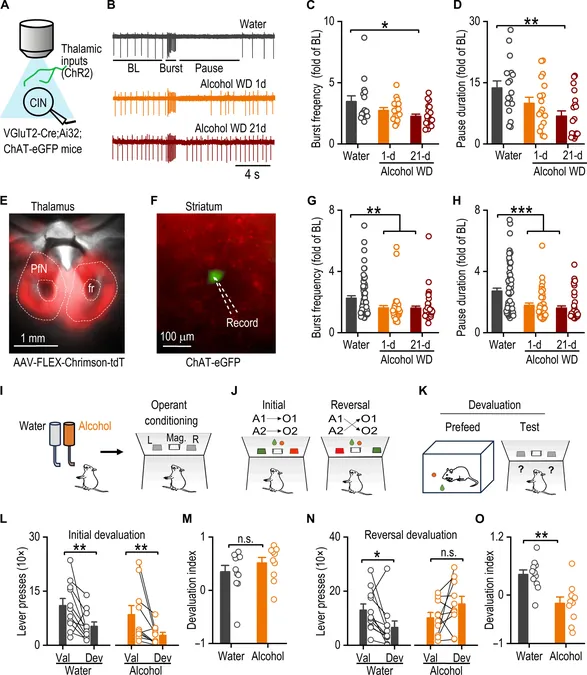
Groundbreaking Study Unveils How Alcohol Ruins Our Cognitive Skills – A Must-Read for the 400 Million Affected!
2024-12-20
Author: Li
Introduction
Alcohol use disorder (AUD) is not just a personal struggle; it affects about 400 million people globally and is a major contributor to severe health issues like cancer, cardiovascular disease, liver disease, and stroke. However, the ramifications extend far beyond the physical realm, significantly impairing vital brain functions essential for learning, memory, and adaptability—collectively known as cognitive flexibility.
Research Findings
Recent research from Texas A&M University College of Medicine has unearthed alarming insights into how chronic alcohol consumption disrupts specific brain signaling pathways, particularly impacting cognitive flexibility. Published in the esteemed journal Science Advances, this study emphasizes the critical function of cholinergic interneurons (CINs) in understanding the cognitive decline associated with AUD.
The Role of Cholinergic Interneurons
Lead researcher Dr. Zhenbo Huang and his team have made a pivotal discovery: chronic alcohol exposure alters the firing patterns of CINs—neurons that release acetylcholine, a crucial neurotransmitter involved in learning and behavior control. "Dopamine neurons create the brain's reward landscape, while CINs manage what stimuli actually get through to activate those pathways," explained Dr. Jun Wang, associate professor at the Texas A&M College of Medicine.
Optogenetics and Its Insights
Utilizing cutting-edge optogenetics—an innovative technique that employs light to manipulate cell activity—the team revealed how stimulating CINs in animal models that had experienced chronic alcohol exposure resulted in significant changes in firing patterns compared to non-exposed counterparts. In healthy conditions, CINs exhibit a "burst-pause" firing style—dynamic bursts of activity followed by brief pauses, a necessary framework for acquiring new behaviors and adjusting to changes in the environment. However, the alcohol-exposed models showed disrupted patterns: shorter and weaker pauses, drastically reducing their capacity for essential learning processes like reversal learning.
Importance of Reversal Learning
"Reversal learning is vital for cognitive flexibility—it empowers individuals to discard old behaviors in response to changing rules or environments, a critical process reliant on acetylcholine signaling," Dr. Wang emphasized.
Diverse Functions of CINs
The researchers combined optogenetics with fiber photometry, employing genetically engineered biosensors that measure real-time acetylcholine release during various tasks. Through this dual approach, they discerned distinct functions for the firing phases of CINs. The "burst" phase enhances extinction learning—where outdated behaviors are unlearned—while the "pause" phase is key for reversal learning, enabling the absorption of new information that replaces obsolete behavior patterns.
Implications and Future Directions
This revolutionary study not only reveals how alcohol decimates these cognitive mechanisms but also opens doors for identifying therapeutic targets that could mitigate the cognitive impairments associated with AUD. The consequences of such research are profound, hinting at the potential for developing treatments not only for addiction but also for aging and neurodegenerative diseases.
Commitment to Further Research
Dr. Wang’s team is committed to furthering this important research, hoping to apply their findings to tackle a wide array of brain disorders—from addiction to age-related cognitive decline. As the world grapples with the pervasive impact of alcohol on mental health, this study serves as a clarion call for attention, understanding, and action. Shocking revelations like these highlight the urgent need for innovative therapies to restore cognitive function and offer hope to millions affected by these debilitating conditions.





 Brasil (PT)
Brasil (PT)
 Canada (EN)
Canada (EN)
 Chile (ES)
Chile (ES)
 España (ES)
España (ES)
 France (FR)
France (FR)
 Hong Kong (EN)
Hong Kong (EN)
 Italia (IT)
Italia (IT)
 日本 (JA)
日本 (JA)
 Magyarország (HU)
Magyarország (HU)
 Norge (NO)
Norge (NO)
 Polska (PL)
Polska (PL)
 Schweiz (DE)
Schweiz (DE)
 Singapore (EN)
Singapore (EN)
 Sverige (SV)
Sverige (SV)
 Suomi (FI)
Suomi (FI)
 Türkiye (TR)
Türkiye (TR)